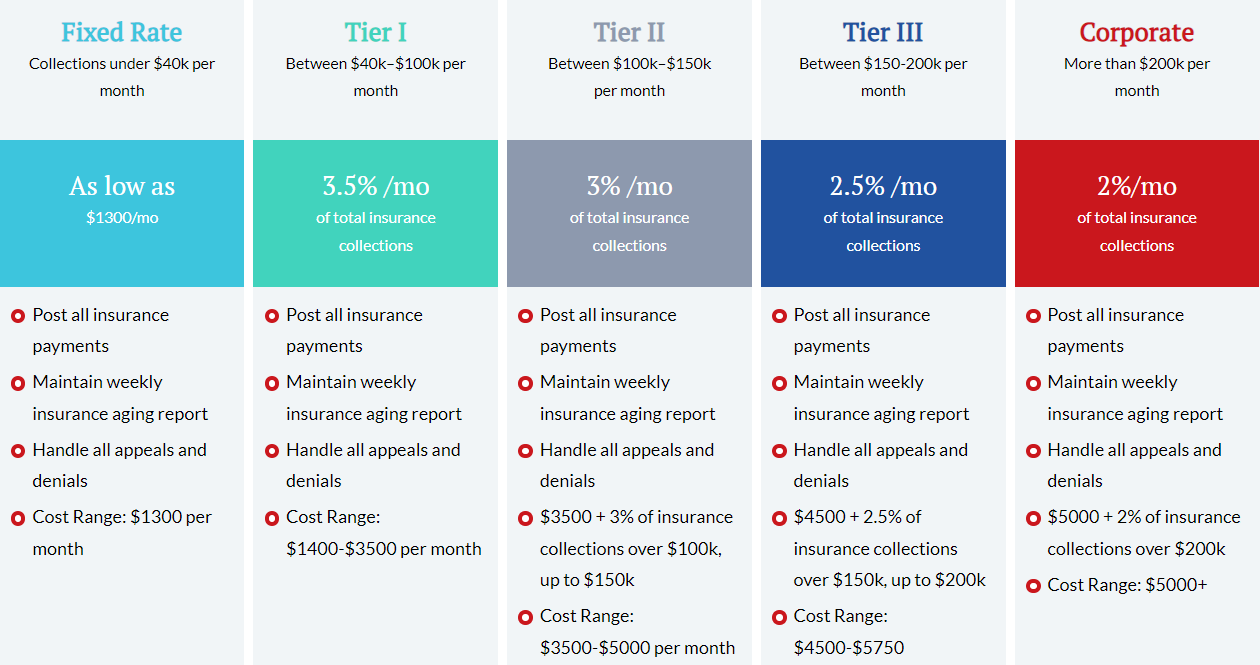5 factors that affect your monthly cost for dental billing services


When you explore outsourcing your dental billing, your first question is likely to be, “How much do dental billing companies charge? ” And if you ask any remote dental billing companies, there’s not typically a cut-and-dried answer. This can feel a little frustrating to dentists - but the reason there isn’t one magic number is that several factors can affect dental billing pricing.
Through 10 years at Dental ClaimSupport, - we’ve seen that being transparent about pricing and cost factors is the best strategy for a clear picture of how pricing works.
So we’re giving you some tips about pricing to make it easier when comparing companies.
As a dentist, you don’t have time to go scouring a website to pinpoint what this resource is going to cost - and not every billing company has it listed on their site. That’s why you need to be informed on how most billing companies’ pricing is structured.
That’s why in this article, we’re going to help you understand what could affect that monthly cost with a dental billing company. We will walk you through 5 factors you can expect to affect the cost so that you can feel better prepared and more confident when researching outsourced dental billing services.
1. Total monthly dental insurance payments collected
Many dental billing companies base their cost on insurance collections, solely. Their expert billers will take care of getting insurance claims paid, and their compensation is based on the amount posted to your accounts receivable. This gives you a clear pricing structure, with a built-in performance incentive, all in one.
Here’s is an example of our pricing structure to give you an idea of what it looks like:
As you can see, if you receive up to $40,000 a month in insurance (only) payments, your monthly payment to the dental billing company will be around $1,300.
There are, of course, other billing companies that will bill based on an hourly rate or overall practice production.
The reason tiered billing is so popular is that it helps you see how the service cost is tailored to the size of your practice. You can also see that the more your service collects in dollars, the lower the fee percentage is. That’s another way to see the win-win nature of this pricing structure: The more successful the billing service, the better it is for you, too.
You can learn more about comparing overhead costs with service fees in our Learning Center.
The good thing about a fee structure based on revenue posted is the incentive this gives billers to collect every penny you’re owed from insurance companies. It’s also reflected in what the dental billers see in their paycheck!
2. The size of your dental practice
The sheer volume of dental claims your dental practice needs to file will also be a contributing factor in your monthly billing service’s cost.
If your practice has multiple dentists, you’re going to produce more claims to track and follow up on.
A larger volume of patients may mean that you are going to need multiple billers handling your dental practice’s insurance claims to make sure they are paid efficiently. This is where it’s important to understand the pricing structure of a remote dental billing service.
If your fee is simply a percentage of payments received, you’re billed at that fixed rate. It’s the billing company’s job to make sure to add the extra hands to manage your claims. Any fee change is in increments, in proportion to the payments posted, not a big jump to cover another salary.
3. The number of practice locations
Another factor affecting the cost of your dental billing services is whether your practice has multiple locations.
One of the best ways to simplify your claims collection and recordkeeping is to have all the claims for each location managed by the same dental billing team. That means you can track the performance of each location separately and the group as a whole.
Some billing companies will bill the locations grouped together, some billing companies will bill each location individually.
For example, Dental ClaimSupport bills each location separately. Depending on each location’s monthly collections total, Dental ClaimSupport gets a percentage of that total every month from each location.
4. Whether you’re established or a start-up dental practice
If you’re a start-up dental practice, starting from the ground up - congrats! Everyone has to start somewhere. You’re already ahead of the curve if you’re looking to get the most from your claims by outsourcing your dental billing.
When a start-up dental practice signs on with a dental billing company, they require an initial setup of the software, which would include setups for the providers, claims, and fees.
For a single doctor startup, this may be a flat fee ranging from $1000-$1300 per month for a set period of time, typically 3-5 months once patients have been seen and claims have started to be sent.
If you plan to credential with a PPO at your new location, it is important for startup locations to begin calling dental billing companies at least 3 months prior to opening. Each insurance company is different in how credentialing is handled, and credentialing can take several months.
To learn more about how even start-up dental practices should outsource their billing, visit our Learning Center.
5. The additional services you need
Your priority for outsourcing your dental billing should always be insurance billing, as it is the most complicated and time-consuming part of your dental billing process. However, each dental practice’s needs are different.
Every dental billing company groups its services differently. Usually, insurance billing is the baseline of what they will offer in terms of services, but if you tack on verification, credentialing, reporting, PPO fee negotiations, consulting, or any kind of training, this could increase your monthly fee.
Some dental billing companies may bundle all of their services together under one flat rate, while others do an à la carte style to their services. When we say bundling services, we mean that your practice would receive a listed amount of services for just one price, as opposed to à la carte style, where you pay for each service individually as you add it to your list of needs.
For example, when you sign on when Dental ClaimSupport, for one monthly rate you’d receive the following services:
- Post all insurance payments
- Maintain weekly insurance aging report
- Handle all appeals and denials
Be sure to ask your sales representative to clearly communicate how their services are or are not bundled if their website does not clearly explain this.
Ready to continue your exploration of outsourced dental billing services?
Trying to learn more about outsourced dental billing can be daunting - there is so much information to gather and understand before you can make a decision. Cost is one of many pieces of that puzzle that can get confusing, especially when dental billing companies aren’t upfront about it.
And it’s important to have all of the facts before you sign on with a dental billing company and hand over your insurance claims.
Dental ClaimSupport makes it a point to have multiple calls with a dental office before signing anyone on, so that everyone is on the same page and understands what each party is responsible for, not just cost-wise, but also task-wise.
To learn more about what dental billing companies do and who is responsible for what, visit our Learning Center.

Related Posts
Dental revenue resources from Dental Claim Support


